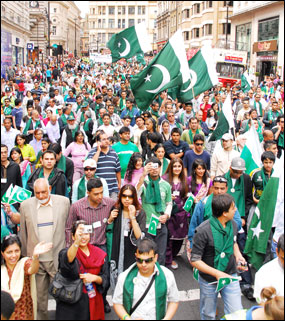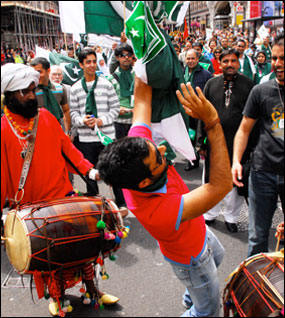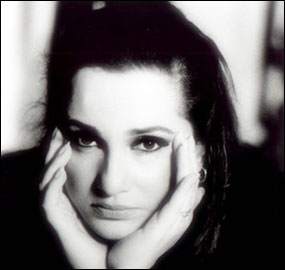|
|
| |
"Patriotism
is not a pill you feed to people, it is a
feeling you have to evoke."
Fifi Haroon on why the Pakistan Day Parade in London was a thumping
success
By
Muniba Kamal
--Photos by Tapu Javeri
|
| |
Pakistan
has come into its own. With the spread of media like wildfire for
the past couple of years, Pakistani channels have also got a foothold
in metropolises all over the world. Dubai, London and USA are the
first obvious targets. Pakistani television is spreading its wings
and along with it, there are signs of the Pakistani expatriate community
being knitted into a larger fabric of the Pakistani identity that
stretches out well beyond the borders of Pakistan.
And in times like these, you have people from the industry here, Pakistanis
who are working for media concerns in major cities of the world. The
most prominent of these is Fifi Haroon, legendary fashion/pop culture
journalist, who eventually launched Xtra magazine that broke new ground,
which perhaps Pakistan wasn't ready for. That has been a trait of
Fifi's – she's always believed in pushing the envelope as far
as it goes and let's face it, there is only so far you can go in Pakistan.
|
 |
| |
| Rather
than compromise on what she wants to do, Fifi went off to London on
a Chevening scholarship and never came back. Right now she is based
there as an executive producer for GEO Television Network. |
| |
| The
last big project under her belt was the Pakistan Day Parade, which
was a first, not only for Fifi, but for Pakistan at large. The brain
child of Maliha Lodhi, Pakistan's High Commissioner to the UK and
GEO in London, the show was given to Fifi Haroon to execute. Pakistan's
most prolific film actress Meera, pop superstars Ali Zafar, Hadiqa
Kiani, Annie, bhangra kings Abrar-ul-Haq, Jawad Ahmad, boxer Amir
Khan, the unforgettable squash player Jahangir Khan, cricketers Waqar
Younis and Azhar Mahmood There was an international influence to the
show too. Signe Anderson was flown in from New York to perform a duet
with Najam, Jinx, the popular Manchester based DJs of Pakistani origin
and Imran Khan, a Dutch Pakistani DJ from Holland were also part of
the playing bill. And the icing on the cake - the show was hosted
by Nadia Khan, by far the most prominent morning show host on Pakistani
television with millions of Pakistanis and Indians catching the Nadia
Khan Show every morning all across the world. |
 |
| |
| And
20,000 Pakistanis turned up to watch. There is a huge diaspora of
Pakistanis all over the world which means that networks like GEO have
an audience all over. Add to that Maliha Lodhi, one of the most progressive
diplomats Pakistan has got and that GEO beams into the UK and has
an audience their and throw in the fact that Fifi's based there as
executive producer and you get a team that can pull off a Parade with
floats, a concert in Trafalgar Square and all the biggest Pakistani
stars in attendance. |
| |
| "To
do an event in Central London is not easy," recalls Fifi who
has just returned home frazzled after being stuck in traffic jams
that hit Karachi after the rains. "One has to deal with a large
number of organisations. There is the Greater London Authority (GLA),
Trafalgar Square is managed by one organization, Westminster by another,
Piccadilly by a third. Roads have to be closed down, buses have to
be rerouted. There is the MET Police and separate associations of
stewards who you have to employ for the event. They have safety issues,
jhandas have to be of a non-flammable material, rickshaws have to
be deemed fit to drive on the streets of London. Everything has to
be done way in advance." |
 |
| |
| Fifi
recalls the meetings with representatives from all these bodies and
the Pakistan High Commission. "This is what it takes to do a
show of this magnitude," she says. Dr Akbar Yazdani from Fire
Records flew in with the artists, Catwalk coordinated the fashion
contingent and members from Geo's International Division coordinated
the show that Fifi produced and was creative director of. And when
it beamed live from London on 28 July, it sent ripples through everyone
who watched. It was the first time that patriotism was made fun and
the Pakistanis in London, who till then had been deprived of a landmark
event to call their own turned up in droves to see the stars closest
to their hearts, climb up on Pakistan's unique decorated buses and
wave the Pakistani flag through the streets of Central London that
had been cleared to make way for their overwhelming emotion. |
 |
| |
And that is precisely what Fifi wanted to do. "The way you celebrate
Pakistan is to have fun. You can't force an "official" version
of Pakistan on people; you have to make them feel it," she says
recalling a rickshaw on which the logo said Dil Dil Pakistan. "That
is where the Dil Dil Pakistan theme came from. You are not Pakistani
because you live in Pakistan. You are Pakistani because you carry
Pakistan in your heart."
For Fifi, it was the most memorable show of her life. "When I
saw all the people standing there, my heart skipped a beat,"
she's still wide-eyed at the memory. "The audience were incredible;
they were standing for four and a half hours. And the love with which
they reacted was incredible. It was so palpable that Deepak Perwani
and Adnan Malik were dancing – when do you ever see the fashion
lot go crazy at an awami event?"
And dancing, letting lose and having fun was an important part of
the show. For the national song medley that was the finale, Fifi ended
with 'Dil Dil Pakistan'. "We wanted people to get up and dance.
Not marching, military songs, fun songs. And there are only two Pakistani
songs that people dance to. One is 'Dil Dil Pakistan' and the other
is 'Jazba Junoon'. Other than these two, the rest are just not fun
songs," she says. "We went with 'Dil Dil Pakistan' because
that was the start of band culture in Pakistan."
The other songs decided on were Allan Faqir's 'Itne Bade Jeevan Sagar
Mein' ("Sindh gets forgotten amidst all the music from the Punjab,
it was important to have a Sindhi influence there"), 'Jeevay
Pakistan' ("I'm not too fond of it but it would get the crowd
going. We wanted to be democratic") and 'Main Bhi Pakistan Hoon
Tu Bhi Pakistan Hai' ("It went with the theme of 'we are all
Pakistani' very well").
"I wanted a remix medley because we wanted people to have fun.
And only two people in Pakistan could have done it, Shahi Hasan or
Rohail Hyatt. I got through to Shahi first and he recorded the songs
with the new artists in Lahore," recalls Fifi who acknowledges
all the people from Pakistan who made the show a great success.
One of them she asks especially to be mentioned is a young intern
she had by the name of Nadia Rehman, a 20 year old studying Law in
Cardiff. "She had an option during her summer break: go to film
school in New York or come an intern with me and put this show together.
She came to me," says Fifi, who wanted to give her credit because
as an intern, she got paid next to nothing. People who say that there
is no patriotism in the younger generation really don't know what
they are talking about. There is patriotism, but the younger generation
ha a whole new way of expressing it, other than saluting the Pakistani
flag and holding their hand to their heart when the Pakistani national
anthem comes on.
It is this spirit that the Pakistan Day Parade tapped in to. Pakistan
has gone beyond the narrow boundaries of the traditional Pakistani
identity; it has marched all over the world. This year it danced through
the streets of London to the rhythms of the pop that has become a
movement in our country now and even did dhamaal to the beat of Pappu
Saeen's dhol.
--Pakistan zindabad indeed! |
| |
|

